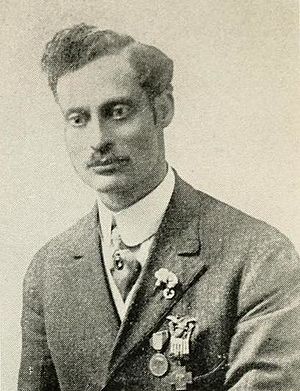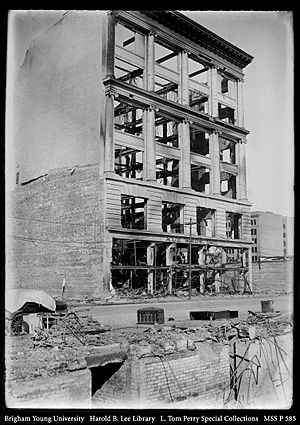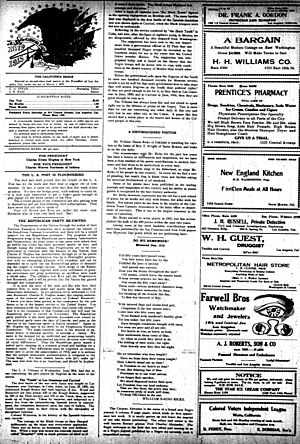William Nauns Ricks facts for kids
Quick facts for kids
William Nauns Ricks
|
|
|---|---|

|
|
| Born | September 6, 1876 Wytheville, Virginia, US |
| Died | September 14, 1948 (aged 72) Oakland, California, US |
| Resting place | Golden Gate National Cemetery |
| Occupation | Poet |
| Notable works | The Whistle Maker, and Other Poems |
William Nauns Ricks (September 6, 1876 – September 14, 1948) was an American poet. He lived and worked mostly in the San Francisco Bay Area in California. He wrote hundreds of poems, which were often printed in newspapers. He also published one collection of his poems.
Ricks was born in Virginia. After serving in the Spanish–American War, he moved to California in 1902. His first poem was published in a newspaper that same year. He settled in San Francisco in 1904. Ricks wrote about many different topics, including ideas about being American and issues related to different ethnic groups.
Contents
Life and Times
Early Life and Influences (1876–1898)
William Nauns Ricks was born in Wytheville, Virginia. This was during the last years of the Reconstruction era after the Civil War. His parents were Lucy Phoebe and William Ricks.
A writer named Delilah Beasley said that Ricks had "mixed Indian parentage." She also claimed he was a direct descendant of the Native American leader Powhatan through his mother. Beasley wrote that Ricks understood early on that his background would make life challenging. After seeing a difficult event involving a young Black person, he promised himself he would dedicate his life to helping the African American community.
Throughout his life, Ricks joined many groups and supported different political causes. When he was young in Virginia, he helped Black citizens register to vote for the Republican Party. At 18, he moved to Roanoke. There, he joined a group called the Odd Fellows and became a leader. He was also part of the True Reformers, a very important Black community group in Virginia during the late 1800s.
Army Service (1898–1902)
Ricks joined the Army in 1898 in Wytheville. He served as a soldier in the Spanish–American War. He was discharged in 1902 from a recovery camp on Angel Island in California.
It seems he became sick or was injured while serving in the Philippines. He was sent back to the United States around 1902. However, it's not clear if he was in actual combat. Ricks was a member of Company A of the 24th Infantry Regiment. This regiment was mostly made up of Black soldiers. His military service showed how much he loved his country, a feeling he kept throughout his life.
After the war, Ricks joined a group for veterans called the Military Order of Serpents. He was elected an officer in this group. It seems this organization was mainly for soldiers who had fought in the "Spanish War," as they called it.
Life in California (1902–1948)
Ricks stayed in California after the war until he passed away. He first lived in Los Angeles and other cities in southern California. Then, in 1904, he moved to San Francisco.
In the early 1900s, California did not have a very large Black population compared to states in the East. However, it was home to many groups, like the NAACP. These groups worked to fight against unfair laws and practices, known as Jim Crow laws, in the American West. Ricks was involved with the NAACP when he lived in southern California. He was also a member of the Los Angeles Men's Forum, a group that aimed to help Black people work together for their progress.
In San Francisco, Ricks worked several jobs. Later, he became an office worker at the California Packing Company, which is now known as Del Monte. He worked there until 1946, just two years before he died. Around 1915–1917, he lived on Market Street in San Francisco. He continued to be involved in politics in San Francisco. He served on the Republican State Central Committee and worked as an election judge.
Ricks was also a talented musician. He played the cello and sang. In 1915, he performed in a singing concert in Oakland. The community organized this concert as an alternative to a play called The Clansman: A Historical Romance of the Ku Klux Klan. This play, which was seen as offensive, was performed in San Francisco for several weeks that year.
William Nauns Ricks passed away on September 14, 1948, at a veterans' hospital in Oakland. He is buried in Golden Gate National Cemetery.
Poetry and Themes
Overview of Ricks's Poetry
Ricks's poems covered a wide range of topics. His personal papers, kept at the Bancroft Library, contain over 450 poems and nearly 100 short stories. His only published collection of poems is named after his 1914 work, "The Whistle-Maker." This poem compares a person who makes and plays whistles to famous figures from ancient Greek myths, like Orpheus and Pan.
According to a description of Ricks's life at the California State Library (which he likely wrote himself), his work was published in newspapers like the Los Angeles Times and Oakland Tribune. He also mentioned losing many of his writings in the 1906 San Francisco fires. His first poem was published in the Daily News-Star in Pasadena in 1902. Publishing poetry in newspapers was very common in the early 1900s in America, and Ricks had hundreds of his poems featured in popular newspapers.
An article from 1940 in the California Eagle newspaper stated that one of Ricks's poems was included in the "largest book of poetry in the world." This book was shown at the 1939 World's Fair.
Political and Social Messages
Among the many topics Ricks wrote about, he often focused on political and social issues. This included the challenges faced by Black Americans and his hopes for progress and equality in the United States.
His 1916 poem, "Lynched—At Waco, and on Calvary," compares the act of lynching to the crucifixion of Jesus. Given the title and the year it was written, Ricks was likely responding to the terrible lynching of Jesse Washington that happened in Waco, Texas, in 1916.
When introducing Ricks's poem "Do We Remember?—Memorial Day, 1916," which was published in the California Eagle, a writer commented:
Just as famous poets like Walter Scott and Robert Burns wrote about their homelands, Mr. Ricks writes about his people in this country. In every part of his work, we find a strong, yet polite, request for everyone to live together in peace and understanding.
The poem likely refers to the end of the American Civil War in 1865, as it often mentions events from 50 years before. It is written in quatrains (four-line stanzas) with a rhythm called iambic tetrameter. In the last stanza, Ricks writes:
Do we remember why they fought?
Have we from them their vision caught?
Does Liberty stand out as clear?
Is Freedom to our hearts as dear?
...
Let Freedom true our land embrace,
That we, like them, the grave may face;
In conscious pride of work well done,
To keep Old Glory in the sun.
On July 1, 1917, Ricks wrote a special poem, called an ode, for Lieutenant Colonel Charles Young. Young was the first African American to become an Army colonel. Ricks's poem was given to Young at an event organized by the NAACP where Young was speaking. This poem, also in iambic tetrameter, began:
Could I portray in words of grace
The service you have done your race;
Could I but half such service do;
Then I might pen a song to you.
See also
 | Ernest Everett Just |
 | Mary Jackson |
 | Emmett Chappelle |
 | Marie Maynard Daly |



